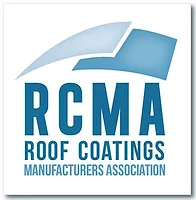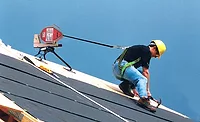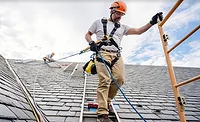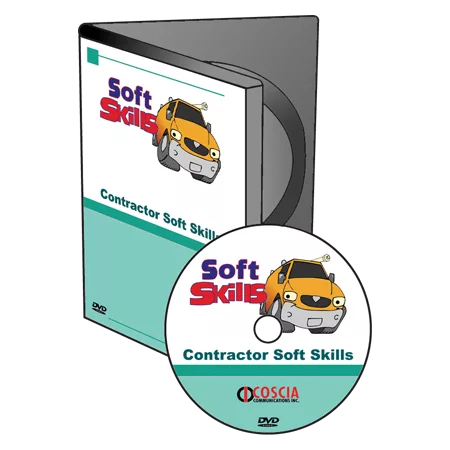Safety Fest! Contractor’s Good Attitude Promotes Safety
“Safety is not a matter of being able to afford it or not afford it; it is a moral issue.”
Does this sound like something you might hear in a lecture from a safety consultant or an OSHA inspector? Well, refreshingly enough, it comes from Pete Korellis, president of Korellis Roofing Inc., Hammond, Ind. Korellis believes that an owner should feel confident that he or she is providing the training necessary for employees to do their jobs in a safe manner.
“As business owners, we are morally accountable,” says Korellis. “Workers need to know about the hazards they will face on the job.”
Korellis’s father, George, started the company in 1960. Still a family-owned business, the union shop employs about 60 people, with approximately 50 roofers and the rest office and administrative personnel. Working in northwest Indiana and the Chicago area, Korellis Roofing does about 85 percent commercial and industrial work and 15 percent residential. Reroofing older facilities makes up a large part of the business.
Korellis says that he has worked at the company “since birth,” starting full time in 1983 after finishing college. And what is the secret to the company’s longevity and success? “My father always told me to hire people smarter than myself,” Korellis jokes. “And to give them the tools they need to grow.”
In the Classroom
Obviously, proper safety training is one of the most important tools for a roofer to have. Three years ago, Randy Stahl joined Korellis Roofing to become the company’s safety manager, a position that had recently been added. According to Stahl, Korellis Roofing had incurred rapid growth during the 1990s, so he had to update OSHA record-keeping practices, accident reporting methods and safety training. Even Stahl himself had to have a lot of training the first year.One day, while reading a trade publication, Stahl saw an article on an East Coast company that devoted an entire day to safety training. This sparked his interest and Stahl started brainstorming. He realized that a nearby hotel would be able to accommodate the company’s 50 roofers, and shortly thereafter, “Safety Fest” was born.
Safety Fest is a daylong seminar that includes intensive training sessions on fall protection, material handling and other pertinent topics presented by certified instructors. Employees are divided into four groups and attend 45-minutes classes, followed by 15-minute breaks, throughout the day.
“The first two years I was doing a lot of running around to make sure things were organized,” says Stahl. “But this year went much smoother. I was able to sit in on the classes and learned some things myself.”
Safety Fest III, held in March 2002, consisted of seven classes. “Safety is Your Responsibility,” taught by Gary Glader of Network Safety, related the responsibility for safety to each individual. In addition, Glader presented “Fork Lift Standard,” the classroom section of the OSHA Power Lift Truck training requirements. Luis Paz, also from Network Safety, taught “Electrical Standard,” which focused on OSHA’s requirements in this area.
Jim Arendas, from the Construction Advancement Foundation, did a 45-minute overview/review of fall protection for roofing. Adam Gawlikowski from Applied Management Services, presented, “Leadership: A Personal Expression of Commitment,” an interactive program on effective leadership.
Scott Fleming of the Indiana State Police Vehicle Enforcement Division offered “DOT Regulations,” which covered procedures to follow in the event of an accident in a company vehicle. Also included were a discussion of the dangers of road rage; drivers license requirements for commercial vehicles; hauling hazardous materials; the most frequent citations; and why vehicles get pulled over.
Finally, new this year, Rick Brasel and Jim Panozzo from Comprehensive Industrial Services taught a class on body mechanics in order to educate employees on the correct methods for lifting, standing and sitting to prevent back injuries. This class was a kick-off to Korellis Roofing’s injury prevention program.
“We do a lot of tear-offs and labor-intensive work,” Stahl explains. “We’ve had our share of back and shoulder injuries.” Stahl says the body mechanics class was helpful because it taught stretches and proper lifting techniques in order to avoid injury. In addition, “Bad habits at work carry over to the home and vice versa, so home-related techniques were covered as well.”
Investing in Long-term Success
Safety Fest is made possible by a grant from OSHA and is held in conjunction with the Construction Advancement Foundation. The CAF represents northwest Indiana union contractors in a variety of fields, including roofing, plastering and lathing, interior finishing, insulation and general contracting.“We were able to put every one of our roofers through the OSHA eight-hour fall protection class,” says Stahl. “It seems like most companies don’t want to spend a lot of money on training. It’s refreshing to work for a company that understands that safety investment is for long-term success.”
Korellis Roofing sends letters to its customers and suppliers, to let them know about Safety Fest. For Safety Fest II in 2001, a customer sent three maintenance technicians to sit in on classes.
“Another customer wants its maintenance people to participate next year,” says Stahl. “Customers recognize that safety is important to us, and we know what we’re doing.”
Perhaps more importantly, Korellis Roofing’s employees recognize that their company takes safety seriously. The company’s workers are asked to fill out an evaluation form at the end of Safety Fest and the comments are more than 95 percent positive.
“They also offer suggestions for class topics,” says Stahl. “I think the only negative comment had to do with the food.”
One question in particular asks if employees feel the company has provided them the necessary safety tools and training. “Ninety-nine percent said ‘yes,’” says Korellis. As an owner, that is certainly rewarding. “Most people think safety is a way to decrease insurance costs,” says Korellis. “Again, it’s personal accountability.”
Looking for a reprint of this article?
From high-res PDFs to custom plaques, order your copy today!






